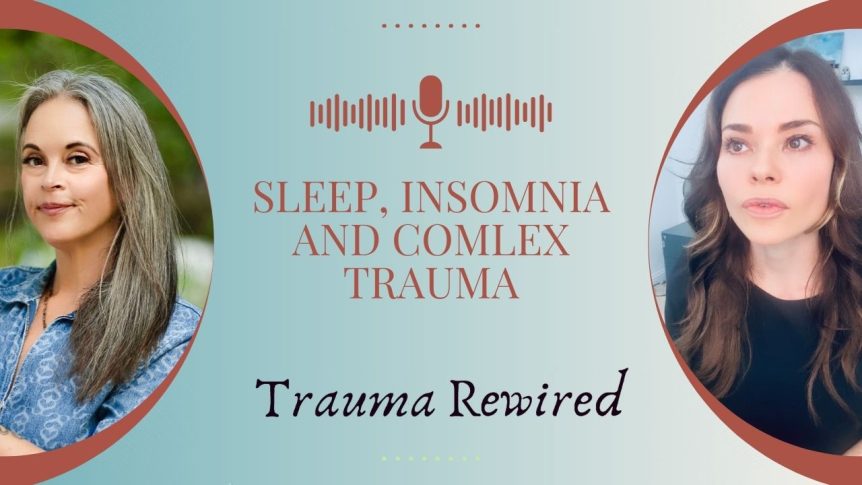
In this episode, we delve into the profound connection between trauma, attachment wounds, and insomnia. We begin by discussing how secure attachments, particularly with family members like grandparents, can mitigate stress but their loss can trigger insomnia and other physical symptoms.
We both host share personal anecdotes to highlight the pervasive impact of family disruptions and relational stressors on sleep patterns and mental health. The dialogue underscores how medical trauma exacerbates feelings of vulnerability and helplessness, often leading to severe insomnia.
We explore the complicated interplay between trauma-related HPA axis dysregulation and sleep cycles. Dysregulated cortisol levels, triggered by trauma, disrupt the natural circadian rhythm, leading to sleep issues such as frequent awakenings and trouble achieving deep sleep.
We emphasize that while general sleep hygiene recommendations—such as reducing screen time and exposure to natural light—are useful, they often fall short for trauma survivors. For this group, insomnia is connected more deeply to stress and attachment-related issues, necessitating specialized approaches to treatment.
Throughout the discussion, we provide insights into the physiological processes governing sleep, such as homeostatic sleep drive (Process S) and circadian rhythm (Process C). We offer practical advice like morning light exposure and winding down before bed. We also explain how REM and non-REM sleep stages contribute to emotional processing and memory consolidation, making sleep an essential component of recovery and mental health.
The episode concludes with actionable tips for better sleep hygiene and stress management, acknowledging the intricate challenges faced by those dealing with complex PTSD and trauma-induced insomnia.
Topics Discussed
Secure Attachment and Stress: The impact of losing secure attachments, leading to stress and insomnia.
Family Disruption: How significant family breakdowns and ongoing conflict impact mental health and sleep.
HPA Axis Dysregulation: The role of trauma in disrupting the HPA axis and elevating cortisol levels, affecting sleep cycles.
Medical Trauma Impact: The link between medical trauma, vulnerability, and insomnia.
Trauma and Circadian Rhythm: How trauma-related dysregulation affects the balance between melatonin and cortisol.
Sleep Hygiene Tips: Practical strategies for better sleep, such as exposure to natural light and reducing screen time.
REM and Non-REM Sleep: The importance of these sleep stages for emotional processing and memory consolidation.
Emotional Flashbacks: How nighttime triggers emotional flashbacks associated with past trauma, disrupting sleep.
If you would like to WATCH the episode and/or have closed captions, check out our Trauma Rewired YOUTUBE channel!
If you need access to transcripts of this episode, you can find that HERE on Apple Podcasts.
Get started training your nervous system with our FREE 2-week offer on the Brain Based Membership site: https://www.rewiretrial.com
Connect with us on social media: @trauma.rewired
Join the Trauma Rewired Facebook Group! https://www.facebook.com/groups/761101225132846
Learn more about the Neuro-Somatic Intelligence Coaching program and sign up for the fall cohort now! https://www.neurosomaticintelligence.com
FREE 1 Year Supply of Vitamin D + 5 Travel Packs from Athletic Greens when you use our exclusive offer: https://www.drinkag1.com/rewired
This episode was produced by Podcast Boutique https://www.podcastboutique.com
Trauma Rewired podcast is intended to educate and inform but does not constitute medical, psychological or other professional advice or services. Always consult a qualified medical professional about your specific circumstances before making any decisions based on what you hear. We share our experiences, explore trauma, physical reactions, mental health and disease. If you become distressed by our content, please stop listening and seek professional support when needed. Do not continue to listen if the conversations are having a negative impact on your health and well-being. If you or someone you know is struggling with their mental health, or in mental health crisis and you are in the United States you can 988 Suicide and Crisis Lifeline. If someone’s life is in danger, immediately call 911. We do our best to stay current in research, but older episodes are always available. We don’t warrant or guarantee that this podcast contains complete, accurate or up-to-date information. It’s very important to talk to a medical professional about your individual needs, as we aren’t responsible for any actions you take based on the information you hear in this podcast. We invite guests onto the podcast. Please note that we don’t verify the accuracy of their statements. Our organization does not endorse third-party content and the views of our guests do not necessarily represent the views of our organization. We talk about general neuro-science and nervous system health, but you are unique. These are conversations for a wide audience. They are general recommendations and you are always advised to seek personal care for your unique outputs, trauma and needs. We are not doctors or licensed medical professionals. We are certified neuro-somatic practitioners and nervous system health/embodiment coaches. We are not your doctor or medical professional and do not know you and your unique nervous system. This podcast is not a replacement for working with a professional. The BrainBased.com site and Rewiretrail.com is a membership site for general nervous system health, somatic processing and stress processing. It is not a substitute for medical care or the appropriate solution for anyone in mental health crisis. Any examples mentioned in this podcast are for illustration purposes only. If they are based on real events, names have been changed to protect the identities of those involved. We’ve done our best to ensure our podcast respects the intellectual property rights of others, however if you have an issue with our content, please let us know by emailing us at traumarewired@gmail.com All rights in our content are reserved.